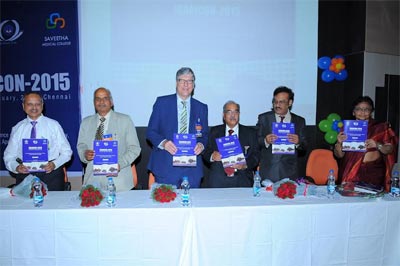No. of views : (3270)
Leading Allergists discuss solutions to alleviate the Allergy burden in India
Posted on: 30/Jan/2016 9:46:30 AM

Saveetha Medical College and Hospital, Saveetha University,organized ICAAICON-2015-a four day, 49th National Conference of Indian College of Allergy, Asthma & Applied Immunology at Saveetha University`s, Thandalam campus.The conference was inaugurated by Dr.Martin Chapman.
The conference attracted about 300 national and international Allergy experts under one roof for discussion on prevalence, trends and latest advances in Allergy, Asthma and Immunology.ICAAI National President K B Gupta presided over the function .ICAAI National Secretary A B Singh read the report.Organising co- Chairman Dr.Chithra welcomed the gathering and Organizing Secretary Dr.Major.Nagaraju proposed a vote of thanks.
Stating the increase of Allergies in Chennai, Prof. Major. Dr. K. Nagaraju, Organising Secretary said, About 20-30 percent of India`s population suffers from at least one of the allergic diseases.In the past years, there has been an -15-20 percent increase of allergy incidence in Chennai. House dust mites (50 percent) is the leading allergen in Chennai followed by pollen (23 percent), insect (16 percent) and food (1-5 percent) allergens. Allergic rhinitis is prevalent in about 42 percent of people between 20 �40 years. Prevalence of coexisting allergic rhinitis & asthma is highest amongst children & young adults (5- 20 years) at 45 percent prevalence.
Commenting on the allergy trend in India, Dr. A B Singh, Emeritus Scientist(Ex ) , Institute of Genomics and Integrative Biology, Delhi and Secretary of Indian College of Allergy ,Asthma and Applied Immunology ,said Top allergies observed in India are that of respiratory, skin, food and dust mites. 80 percent of allergy cases in India are hereditary. Dr. A B Singh also spoke of his observation on pollen allergy trend - Pollen allergens from trees, grasses, flowers and weeds cause respiratory allergies in 20 perceent of the India`s allergic population. The trend increases at the onset of spring and autumn. Dr Singh has identified important pollen allergens of the country as a result of more than 30years of experience in research. Allergies are an over-reaction of the immune system in the form of antibodies to exposed proteins which are not necessarily harmful. These antibodies cause an allergic reaction which cause symptoms in the nose, lungs, throat, sinuses, ears, lining of the stomach or on the skin. Some symptoms include incessant sneezing, runny nose (rhinitis), difficulty breathing, hives and dermatitis. Allergies if undiagnosed or ill-managed may culminate to persistent allergic rhinitis and severe asthma.
For more inquiries please contact:








